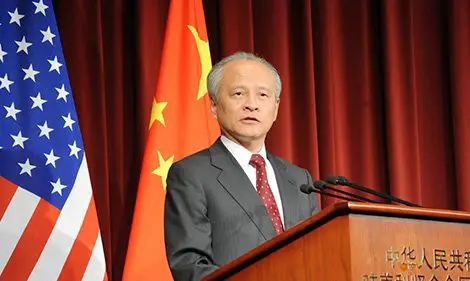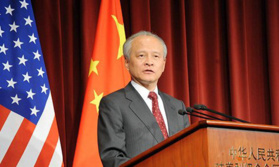BEIJING, June 9 (People’s Daily) While reassuring the world Monroe Doctrine is out-of-date in the 21st century, China's Ambassador to the U.S. launched an appeal for a peaceful South China Sea.
In an article wrote for Bloomberg Review titled ” How to Bridge the Divide Over the South China Sea”, Cui Tiankai stressed that China are ready to work in a constructive manner with United States, “and we are hopeful that the U.S. will demonstrate the same spirit,” he said.
Cui's opinion piece comes amid the tensions between China and U.S. over the recent frictions on the South China Sea. “Reclamation and construction works have taken place on islands and reefs that have long been under China’s control, and many of the facilities are for civilian purposes and public good, such as navigation and rescue services, emergency relief, scientific research, and environmental protection. There are limited defense facilities, but they do not represent a ‘militarization’ of the area.” Cui explained.
And he also mentioned that “recent statements and military deployments by the U.S. have had the effect of escalating tension in the region and, if not curbed, risk the very militarization we all wish to avoid.”
To respond the pressure from U.S. and other nations, Cui declared again that China will neither participate nor accept the arbitration initiated by the Philippines and listed the reason: the United Nations Convention on the Law of the Sea does not cover sovereignty and territorial issues, so the tribunal has no jurisdiction in this realm.
Cui also pointed out the incompatible behaviors of United States: restraint China with a convention that itself refused to ratify.
Cui admitted the differences between China and the U.S. over the South China Sea issue have become a matter of concern and even anxiety, and some of the perceptions in the U.S. and elsewhere about China’s policy and intentions in the area are misplaced. “A pressing task is to understand the facts and China’s intentions correctly so as to avoid real danger and consequences as a result of misinterpretation and miscalculation.” He wrote.
Furthermore, he stressed that China consistently strives for regional cooperation, and respect America’s traditional presence and legitimate interests in the Asia-Pacific region. He believed that China and the United States share important interests in this area, and should resolve disputes through peaceful negotiations and diplomatic dialogue.
“The region should not become a competing ground for China and the U.S. In fact, we have significant potential for cooperation in this region and beyond,” he added.
In an article wrote for Bloomberg Review titled ” How to Bridge the Divide Over the South China Sea”, Cui Tiankai stressed that China are ready to work in a constructive manner with United States, “and we are hopeful that the U.S. will demonstrate the same spirit,” he said.
Cui's opinion piece comes amid the tensions between China and U.S. over the recent frictions on the South China Sea. “Reclamation and construction works have taken place on islands and reefs that have long been under China’s control, and many of the facilities are for civilian purposes and public good, such as navigation and rescue services, emergency relief, scientific research, and environmental protection. There are limited defense facilities, but they do not represent a ‘militarization’ of the area.” Cui explained.
And he also mentioned that “recent statements and military deployments by the U.S. have had the effect of escalating tension in the region and, if not curbed, risk the very militarization we all wish to avoid.”
To respond the pressure from U.S. and other nations, Cui declared again that China will neither participate nor accept the arbitration initiated by the Philippines and listed the reason: the United Nations Convention on the Law of the Sea does not cover sovereignty and territorial issues, so the tribunal has no jurisdiction in this realm.
Cui also pointed out the incompatible behaviors of United States: restraint China with a convention that itself refused to ratify.
Cui admitted the differences between China and the U.S. over the South China Sea issue have become a matter of concern and even anxiety, and some of the perceptions in the U.S. and elsewhere about China’s policy and intentions in the area are misplaced. “A pressing task is to understand the facts and China’s intentions correctly so as to avoid real danger and consequences as a result of misinterpretation and miscalculation.” He wrote.
Furthermore, he stressed that China consistently strives for regional cooperation, and respect America’s traditional presence and legitimate interests in the Asia-Pacific region. He believed that China and the United States share important interests in this area, and should resolve disputes through peaceful negotiations and diplomatic dialogue.
“The region should not become a competing ground for China and the U.S. In fact, we have significant potential for cooperation in this region and beyond,” he added.
 Menu
Menu
 China ready to work in a constructive manner with U.S.
China ready to work in a constructive manner with U.S.

















